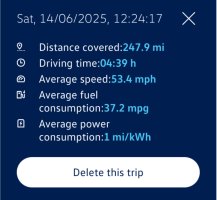1. On my Hybrid Multivan with a 11Kw battery and 45l petrol tank, with full charge and full tank it predicts 350 miles and I have covered 368 miles before the Low Fuel notification at 5 L remaining.
2. The EV range is based on a complicated calculation.
One thing that VW don’t mention in the Handbook for the Hybrid. My VW Dealership , nor VWUK, new this.
The predicted milage for a full 100% charge of the EV battery is a dynamic calculation based on a number of factors.
Volkswagen hybrid vehicles (like the Golf GTE, Passat GTE, or the newer PHEV models) calculate the predicted electric-only (EV) mileage from a full charge using a dynamic algorithm that takes several real-time and historical factors into account. Here’s how it generally works:
1.
Recent Driving Behavior
- Acceleration patterns: If you’ve been accelerating aggressively, the car will predict lower EV range.
- Speed: Frequent high-speed driving (e.g., on highways) reduces predicted EV range.
- Braking and regeneration: Efficient use of regenerative braking can increase estimated range.
2.
Climate Control Usage
- Heating and air conditioning (especially in extreme temperatures) significantly impact EV range. If you had them running during your last trips, the system assumes similar energy consumption.
3.
Topography and Route History
- Driving uphill uses more energy; downhill or flat terrain extends range.
- If you’ve recently driven on hilly roads, the system may predict lower EV mileage.
4.
Ambient Temperature
- Cold weather reduces battery efficiency and increases energy use for heating, lowering predicted range.
- Warm temperatures can also impact range, especially if A/C is heavily used.
5.
Battery Condition and Charge Level
- While the car may say 100% charge, the usable battery capacity (called SoH – State of Health) may decline over time, especially with aging batteries.
- VW uses buffer zones in the battery to prevent full charge/discharge cycles, which also affect the maximum theoretical range.
6.
Driving Mode
- If the car is in “GTE” or “Sport” mode, it assumes more power usage.
- In “E-Mode” or “Eco,” it predicts higher EV range.
The resulting predicted EV mileage is thus not a fixed number, but rather a smart estimate—similar to a fuel range prediction in ICE vehicles. You may see it fluctuate from one drive to the next even with a full charge.
3. The EV never goes Flat. A reserve is always kept and it is constantly being topped up by Regenerative Braking and by the IC engine if necessary. EV drive is used for all low speed manoeuvres using 1st and Reverse gears.












